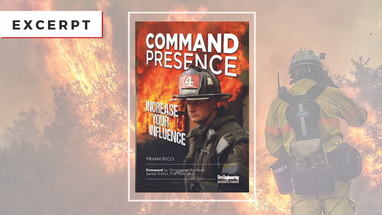May 31st 2024
Excerpt: Command Presence: Increase Your Influence
Book By Frank Ricci
When You’re Not Trained for the Answer
One night, we got a call for an overturned kayak with a paddler screaming in the river. This river is treacherous, with a swift current that is affected by runoff and the tides. The water is dark and brackish. Drownings are not unheard of. The craft was out of reach of any rope and there were no audible screams. I had no experience responding to situations similar in scope to this river. I imminently gave a size-up, ensured the Coast Guard was on their way, and called for the fire department boat.
I sent one of my firefighters upstream to check the bank and radio if any significant debris was coming downstream that could be a hazard for us or the kayaker. My next move was to go to the local marina and ask if anyone had a boat. They were having a party and, ironically, not one member had the keys to any vessel. My next question was if there was any craft anyone knows of with keys in it.
One man responded that he believed there may be one or two on the dock. That was all I needed. I said I needed someone who knows the river to meet me on the dock, and I had firefighter Joe Hilbert look for a craft with keys or a motor we could start. Locating someone else’s boat, I had to decide whether to ask permission of the battalion chief who had just arrived or make the call myself. My thought process was sound. I deducted if I commandeered the craft and got to the kayak before the Coast Guard boat, I would be able to justify my actions.
You have to keep in mind, as a leader and a boss, you can’t ask for permission for every issue,or you will undermine your own command. There is a reason you are in the position you are in. If you are going to abrogate your authority at the time of a tough decision, maybe you shouldn’t have that authority. I knew getting to the kayak was my number one priority and asking would have only put the chief in a bad position. I had a full crew and a stranger who said he knew what he was doing. And when life and safety are on the line, the risk-to-benefit analysis was in favor of borrowing the boat. When in command, command!
I thought for a second about the book It’s Your Ship: Management Techniques from the Best Damn Ship in the Navy by Michael Abrashoff. It was kind of funny, because I was in a stolen boat. However, the author made it clear that if you could justify your actions on the front page and be proud of them, you were making the right call. This was great advice from a great book.
As we rounded the corner out of the marina, I saw the Coast Guard coming up the river. I remember joking with Joe, “If the Coast Guard gets there first and we’re in this stolen boat, you will be getting a new lieutenant!” All of a sudden, the Coast Guard stopped. The borrowed captain told me the sandbar crosses just after the marina and the Coast Guard brought the wrong boat. Their draft was too deep and could not go past the marina. As we made our way to the kayak, I updated command that we had a vessel and were a minute out of the overturned craft. We located the kayak, but no kayaker. Command confirmed with the witness the calls for help and screams.
We spent hours grid-searching the river. Mutual aid was called for side sonar. The Coast Guard next decided to fire flares to help with lighting the top of the water. But the wind was so strong the flares fell into the city. Before command could radio for them to stop, the next one fired on a corrected path and was caught by the wind and blown into a saltwater marsh, lighting a significant marsh fire.
I reported to the command post and docked our craft. The next lesson I learned as a new lieutenant when working with different agencies is always look behind you when you are going to make a light-hearted joke. The chief asked for an update, and I responded, “Well, it was hard to see until the Coast Guard lit the entire marsh on fire. Do we have an update if they know who owned the kayak?” Before I could get the last word out, I realized some high-ranking Coast Guard commander was behind me in the command bus. He stormed out and did not see any humor in the situation. I showed up to work one day to find that my shift had put a pirate flag on the back of the engine.
In the end, it turned out the scream for help was most likely the wind that blew the kayak off the dock. My son-in-law, Brandon DeMars, is a realtor who taught me the treasure is in the follow-through.
I made sure to replace and top off the fuel in the craft we commandeered, and I wrote a letter to the chief recommending the citizen was recognized for assisting the fire department, even though he wasn’t a willing participant. I also reached out to the boat owner to explain the actions we had to undertake and thanked him. He was pleased we didn’t sink the boat and that we replaced the fuel.


